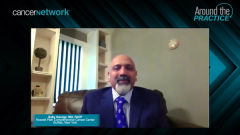
Genomic Testing Practices in Prostate Cancer
Expert perspectives on optimal genomic testing practices in patients with prostate cancer.
Episodes in this series

Transcript:
Robert Dreicer, MD, MS, MACP, FASCO: Let’s go back to the data. Dr Scholz, let’s forget about the triplet intensification. When you’re talking about a patient for whom you’re going to use intensification, and your choice for the patient is docetaxel or 1 of the ARIs [androgen receptor inhibitors], what’s your approach to helping the patient make a decision? For the patient who typically says, “Whatever you think, doctor,” or, “I want the best thing”—you know the drill—how do you work patients through that?
Mark Scholz, MD: Work backward from what the patient’s quality of life is going to be like. There’s no comparison between the toxicity of darolutamide and docetaxel. It’s a no-brainer. My assumption isn’t whether we’re going to have some discussion between docetaxel. Let’s say this patient had a worse ECOG score. If I thought that he’s not a good candidate for docetaxel, I wouldn’t even mention it. I don’t want to confuse my patients. The darolutamide is dramatically less toxic than chemotherapy. They’re not within 2 orders of magnitude of each other. My assumption is this patient would immediately go on the darolutamide in combination, maybe with leuprolide, degarelix [Firmagon], or something of that nature. That’s the default baseline. But when you have metastatic prostate cancer, the question is, what more can we do or what more might we do? We have a lot more tools now, but I’d consider the darolutamide and leuprolide to be the baseline standard for this patient.
Robert Dreicer, MD, MS, MACP, FASCO: Let me step back for a second and ask you both the same question. Genomic testing in prostate cancer has become an important consideration for lots of reasons. What’s your standard approach? The patient you’re seeing for the first time has metastatic hormone-sensitive prostate cancer. Nobody else has done anything or talked to the patient. You’ve had the conversation with the patient I just presented to you about how you’re going to approach them. What’s your approach in terms of how you do genomic testing? Which forms—germline, somatic—and when do you do them? Briefly, tell me, “I do X and Y, here and there.” Dr George?
Saby George, MD, FACP: That’s a great question. I turn to tumor somatic testing rather late in the game because I believe the vast majority of cancer cells and prostate cancer cells are modifiable or can be blocked using AR [androgen receptor]–targeting agents. We discussed earlier that LHRH or testosterone suppression is the mainstay of treatment. When this breaks through or progresses, despite suppression of testosterone, signaling testosterone after testosterone suppression signals the emergence of resistant clones or talk about the heterogeneity of the cells. There are different kinds of cells. Some may be responding to hormones, and some may not be responding to hormone suppression. If that happens, that’s when I get a biopsy and test for somatic mutations. Also, we concurrently do germline testing to see if there’s any BRCA or anything associated with those, so those data can be applied later as additional treatment options. Olaparib and things like that can be used if that’s the case.
Robert Dreicer, MD, MS, MACP, FASCO: Dr Scholz, when do you do your genomic testing?
Mark Scholz, MD: We’ll get a baseline cell-free DNA test in our metastatic patients when we first meet them. We probably wouldn’t put the olaparib as a first line, but it would be nice to know if they were BRCA2, ATM, or something like that. There are rare cases of MMI [maximum medical improvement]. I’ve seen 1 case and you win the lottery for immunotherapy with something like Keytruda [pembrolizumab]. I’d like to know. I don’t want to find those very rare cases. It’s a simple blood test to get cell-free DNA and make sure I’m not missing something.
Robert Dreicer, MD, MS, MACP, FASCO: For our audience, most of our major society guidelines suggest that germline testing should be done early. This is a patient I’d get germline testing on. I agree with Dr George in that I tend not to do somatic testing up front. I just need to know whether they’re BRCA. As Dr Scholz pointed out, we’re not making decisions about management right then. It has some familial issues as we learn more about Lynch [syndrome] and some of the things associated with that. I don’t think any of us knows the optimal time to do somatic testing. Some do tissue-based testing. It’s a bone tropic disease. I’m not a big fan of doing bone biopsies. As the disease progresses, the ctDNA [circulating tumor DNA] is more useful. The somatic testing timing is a bit more amorphous, but there’s reasonably good evidence to suggest that germline testing should be done.
Transcript edited for clarity.
Newsletter
Stay up to date on recent advances in the multidisciplinary approach to cancer.









































